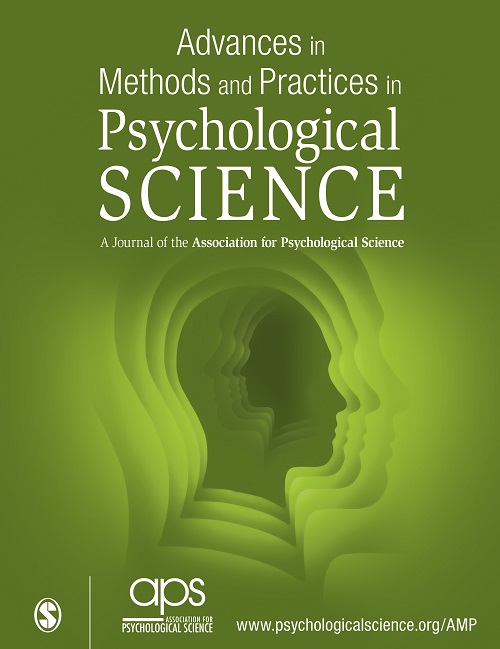Psychology Is a Property of Persons, Not Averages or Distributions: Confronting the Group-to-Person Generalizability Problem in Experimental Psychology
IF 13.4
1区 心理学
Q1 PSYCHOLOGY
Advances in Methods and Practices in Psychological Science
Pub Date : 2023-07-01
DOI:10.1177/25152459231186615
引用次数: 0
Abstract
When experimental psychologists make a claim (e.g., “Participants judged X as morally worse than Y”), how many participants are represented? Such claims are often based exclusively on group-level analyses; here, psychologists often fail to report or perhaps even investigate how many participants judged X as morally worse than Y. More troubling, group-level analyses do not necessarily generalize to the person level: “the group-to-person generalizability problem.” We first argue for the necessity of designing experiments that allow investigation of whether claims represent most participants. Second, we report findings that in a survey of researchers (and laypeople), most interpret claims based on group-level effects as being intended to represent most participants in a study. Most believe this ought to be the case if a claim is used to support a general, person-level psychological theory. Third, building on prior approaches, we document claims in the experimental-psychology literature, derived from sets of typical group-level analyses, that describe only a (sometimes tiny) minority of participants. Fourth, we reason through an example from our own research to illustrate this group-to-person generalizability problem. In addition, we demonstrate how claims from sets of simulated group-level effects can emerge without a single participant’s responses matching these patterns. Fifth, we conduct four experiments that rule out several methodology-based noise explanations of the problem. Finally, we propose a set of simple and flexible options to help researchers confront the group-to-person generalizability problem in their own work.心理学是人的属性,而不是平均值或分布:面对实验心理学中群体对人的普遍性问题
当实验心理学家提出一个主张(例如,“参与者认为X在道德上比Y更糟糕”)时,有多少参与者被代表?这种说法往往完全基于群体层面的分析;在这里,心理学家经常没有报告,甚至可能没有调查有多少参与者认为X在道德上比Y差。更令人不安的是,群体层面的分析不一定能概括到人的层面:“群体对人的可概括性问题”。我们首先主张设计实验的必要性,以调查声明是否代表大多数参与者。其次,我们报告了一项针对研究人员(和非专业人士)的调查结果,大多数人将基于群体层面影响的说法解释为旨在代表研究中的大多数参与者。大多数人认为,如果一种说法被用来支持一种普遍的、个人层面的心理理论,那么情况应该是这样的。第三,在先前方法的基础上,我们记录了实验心理学文献中的说法,这些说法来源于一组典型的群体层面分析,只描述了(有时是极少数)参与者。第四,我们通过自己研究的一个例子来说明这个群体对人的可推广性问题。此外,我们还展示了在没有一个参与者的反应与这些模式相匹配的情况下,如何从一组模拟的群体水平效应中得出主张。第五,我们进行了四个实验,排除了对该问题的几种基于方法论的噪声解释。最后,我们提出了一组简单而灵活的选项,以帮助研究人员在自己的工作中应对群体对个人的可推广性问题。
本文章由计算机程序翻译,如有差异,请以英文原文为准。
求助全文
约1分钟内获得全文
求助全文
来源期刊
CiteScore
21.20
自引率
0.70%
发文量
16
期刊介绍:
In 2021, Advances in Methods and Practices in Psychological Science will undergo a transition to become an open access journal. This journal focuses on publishing innovative developments in research methods, practices, and conduct within the field of psychological science. It embraces a wide range of areas and topics and encourages the integration of methodological and analytical questions.
The aim of AMPPS is to bring the latest methodological advances to researchers from various disciplines, even those who are not methodological experts. Therefore, the journal seeks submissions that are accessible to readers with different research interests and that represent the diverse research trends within the field of psychological science.
The types of content that AMPPS welcomes include articles that communicate advancements in methods, practices, and metascience, as well as empirical scientific best practices. Additionally, tutorials, commentaries, and simulation studies on new techniques and research tools are encouraged. The journal also aims to publish papers that bring advances from specialized subfields to a broader audience. Lastly, AMPPS accepts Registered Replication Reports, which focus on replicating important findings from previously published studies.
Overall, the transition of Advances in Methods and Practices in Psychological Science to an open access journal aims to increase accessibility and promote the dissemination of new developments in research methods and practices within the field of psychological science.

 求助内容:
求助内容: 应助结果提醒方式:
应助结果提醒方式:


